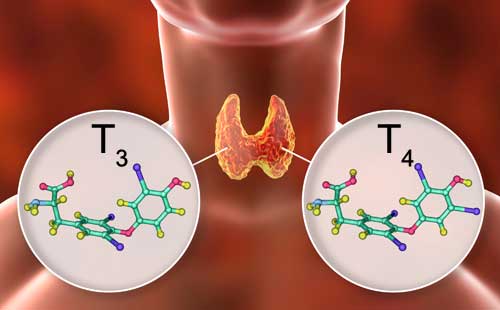

The thyroid is a butterfly shaped gland in the front of the neck that is responsible for making and releasing hormones that regulate a range of body functions, including heart rate, brain function, and body temperature via metabolism. For this reason, it is often blamed when a person just can’t seem to lose weight. It is also often seen as the culprit—or one of the culprits—behind chronic fatigue. When it comes to thyroid conditions, Bothell’s Dr. Nicole Anderson typically works with patients dealing with one or multiple problems.
Thyroid issues are a result of the gland making either too much or too little of its metabolism-regulating hormones. Too much is known as hyperthyroidism, which can make people anxious, tired, and prone to losing weight and muscle. Dr. Anderson regularly treats patients suffering from the opposite condition: hypothyroidism, which is a hormone deficiency that causes fatigue, cold sensitivity, hair loss, and other symptoms, as well as prompts the body to hold onto fat. Hormone therapy can help to restore normal function and provide symptom relief.
Put simply, hypothyroidism is the condition that results from not having enough thyroid hormone.
The thyroid makes hormones commonly referred to as T3 and T4, as well as “reverse T3,” which is an inactive form of T3 made when the body is experiencing chronic stress. The numbers 3 and 4 represent the number of iodine atoms in each hormone. T4 has less activity than T3 and is made in larger quantity. The body can convert T4 to the more active T3 as needed.

Without adequate levels of these hormones, T3 and T4, the body’s metabolism and other processes can become imbalanced, leading to sleep disruption, weight retention, joint pain, memory issues, changes to the menstrual cycle, hoarseness, slow digestion or constipation, hair loss, dry skin, and more.
Since many of these symptoms can also be attributed to other conditions, it is important to get an accurate diagnosis before beginning any treatment. In pursuing a diagnosis, some physicians rely on testing only levels of TSH (thyroid stimulating hormone). The pituitary gland within the brain releases this chemical when more thyroid hormone is needed.
Dr. Anderson explains to patients that doctors who solely test TSH levels are only looking at the signals sent to the thyroid gland. This test does not reveal what levels of hormones the thyroid is actually producing. In order to accurately diagnose thyroid conditions, it is important to get as complete a picture as possible by looking at T3, T4, and potentially reverse T3 as well.
Autoimmune thyroiditis is the most common cause of hypothyroidism and hyperthyroidism. There are multiple types of antibodies that can be tested for. Some antibodies destroy thyroid tissue. Others cause the thyroid to make too much or too little of certain hormones. A thyroid antibodies test usually measures one or more of the following types of antibodies:
Thyroid peroxidase antibodies (TPO): These antibodies can be a sign of Hashimoto’s disease, also known as Hashimoto’s thyroiditis. This is the most common cause of hypothyroidism.
Thyroglobulin antibodies (Tg): These antibodies can also be a sign of Hashimoto disease. Many people with Hashimoto’s disease have high levels of both Tg and TPO antibodies.
Thyroid-stimulating hormone (TSH) receptor: These antibodies can cause Grave’s disease. This autoimmune disease is the most common cause of hyperthyroidism, the condition in which the thyroid makes too much of certain hormones.
It is possible to have elevated antibody levels in the blood but still have a normally functioning thyroid, and it is also possible to have an under-functioning thyroid and have normal antibody levels.
Nutritional deficiencies can be a cause of reduced thyroid hormone levels. An iodine deficiency, for example, is a commonly overlooked cause of hypothyroidism, since the molecule is necessary for building thyroid hormones. Patients who have a shellfish allergy or who cut salt from their diet may simply not be getting enough iodine, which leaves the thyroid less than optimal levels to work with when it comes to making its hormones.
At Anderson Natural Medicine, Dr. Anderson can help hypothyroidism patients with medications or supplements. An iodine deficiency can even be mitigated with a change in diet.
An important part of a treatment is addressing the root cause, not just the symptoms. If ongoing inflammation is at fault, Dr. Anderson will work to discover whether an autoimmune condition heightened stress, or other factors are at play—then will help patients understand how to resolve that specific issue. The goal is to target the source of the problem for long-term results.